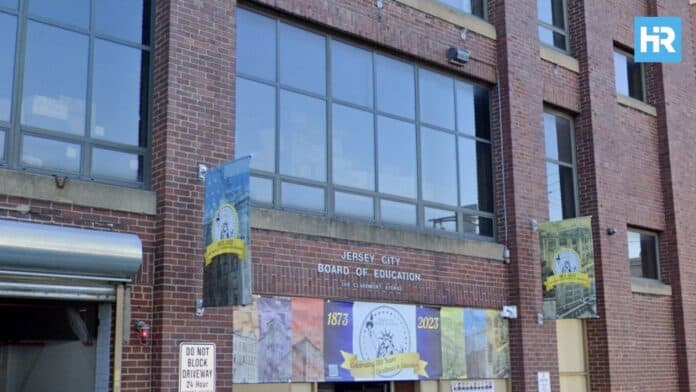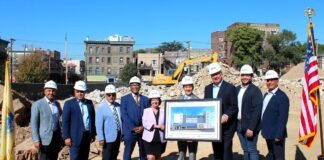The Jersey City Board of Education (BOE) voted 6-2 to approve a $1,027,273,122 budget for the 2025-2026 school year. This total reflects a $8.4 million decrease from the previous year’s budget. Although spending has gone down slightly, local taxes will rise. Residents will see an average monthly increase of $34.08 in property taxes.
The budget includes a two percent tax increase, which is the legal limit. However, this figure is misleading. The board also chose to use $82 million from its banked cap, a mechanism that allows the district to use unused tax increase capacity from previous years. Since that pushed the effective increase well beyond two percent, it raised concern among board members and the public.
- The Jersey City Board of Education approved a $1.03 billion budget with a 6-2 vote, cutting $8.4 million from last year while raising property taxes.
- Despite a 25% increase in payroll tax revenue, the district lost $98 million in equalization aid and faces a 3% drop in total state funding.
- Use of an $82 million banked cap pushed the real tax increase higher than the stated 2%, leading to strong criticism and demands for funding reform.
City Contributions Fall Short as State Cuts Equalization Aid
Dr. Francine C. Luce, Acting School Business Administrator, presented the final budget. She explained that despite some funding increases, the district still faces a large gap. Jersey City lost $98 million in equalization aid this year. That loss, paired with an underfunded city contribution to the district’s Local Fair Share, forced the BOE to rely more on local taxes.
The payroll tax brought in $80.9 million, which was a $15.9 million increase from last year. But at the same time, total state aid dropped by three percent. Equalization aid, which balances state and local funding, saw the steepest cut. This left the board with fewer options to maintain programs.
Even with those cuts, Luce said that all instructional programs are fully funded. The district is spending $15.7 million on teachers, aides, supplies, and textbooks. That amount is an 8% increase over last year. However, some positions remain unfilled, and small cuts are planned in other areas. The district is also focusing more on school renovations, using a recent $4 million grant from the School Development Authority (SDA) for bathroom upgrades in a charter school.
Confusion Over Tax Levy and Budget Transparency
Throughout the meeting, board members and residents questioned several points in the budget. Brigid D’Souza asked if the total school tax levy was $452 million or $534 million. Luce said the numbers were pulled directly from the state budget software and followed the same format used in recent years. She did not provide printed documents at the meeting, which led to further confusion.
Trustee Matthew Schneider asked whether equalization aid was included in the state aid totals. Luce clarified that it was listed separately. Trustee Christopher Tisdale, the board’s vice president, asked why the total levy was not shown in the budget presentation. Luce responded that the format remained consistent with past years and did not include that figure.
Former Trustee Lorenzo Richardson said some budget numbers didn’t add up. He pointed to a $7.5 million increase in state transportation funding and noted that categorical special aid rose by $68 million while security aid rose by $18 million.
Political Candidates and Officials Demand Reform
Ward E Councilman James Solomon, who is running for mayor, spoke during the meeting. He criticized the impact of the tax hike and said the budget would lead to a 16 percent increase in school taxes across the 2025 and 2026 fiscal years. Solomon reminded the board that the City Council had passed measures to boost school funding, but the cuts in state aid made that difficult to sustain.
Several local and state officials also responded after the budget passed. Ward D Councilman Yousef Saleh and Assemblywoman Jessica Ramirez, who are running together in the LD-32 primary, called for statewide school funding reform. Saleh, a graduate of the Jersey City Public Schools, said the system is shortchanging local students. Ramirez agreed and said all children deserve a quality education, no matter where they live.
Katie Brennan and Jennie Pu, also LD-32 candidates, echoed the call for a new funding formula. Brennan attended the meeting and said that money from the SDA has been limited. She noted that the state has not issued a major bond in years, making it hard for districts to rely on facility funding.
Assemblywoman Barbara McCann Stamato and Bayonne Councilwoman Jackie Weimmer, candidates in LD-31, also voiced concern. They said that Bayonne faces similar issues under the state’s S-2 funding formula. Stamato said that enrollment and costs continue to rise while resources shrink. Weimmer stressed that this isn’t just about one year’s budget but about the long-term needs of students.
Board Members Disagree Over Budget Process and Vote
Not everyone on the board supported the final decision. Trustees Schneider and Rezabala voted against the budget, while Trustee Ioffe was absent. After the meeting, Schneider and Rezabala released a statement explaining their vote. They said the approved tax hike was too high and criticized the district for lacking a long-term plan to avoid future increases. They also said the board failed to involve the community enough in the budgeting process.
Tensions also surfaced during the meeting. Trustee Dejon Morris criticized Ioffe’s absence and implied that some trustees were voting based on politics. He pointed out that the three trustees who opposed the earlier preliminary budget were not all present and accused the others of following outside instructions.
Rezabala responded during the meeting, saying her vote was based on financial responsibility. She stated that she had made her decision independently and criticized Morris’s comments. Noemi Velazquez, the board president, tried to calm the discussion and said they could continue the conversation privately. Schneider added that trust should be earned through accountability.
Velazquez also addressed the district’s history with the city government. She said that while property values in Jersey City have increased, the schools haven’t seen their fair share of that growth. The 2024 net valuation of taxable property was $45.39 billion. In 2025, it rose to $47.01 billion. Yet, she said, the city has only provided piecemeal funding, never the full amount owed under Local Fair Share requirements.
Luce added that the average home in Jersey City is assessed at $481,886. She said that while the monthly tax increase will be $34.08, the three-year average still shows a decrease of $16.92 per month. She confirmed that the $82 million from the bank cap is part of the $534 million levy.






